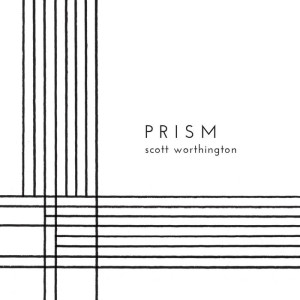PRISM
Populist Records
Los Angeles-based Populist Records has released PRISM, a new CD of music by Scott Worthington. Composed between 2010 and 2012, PRISM widens the circle of masterful work heard on his previous CD Even the Light Itself Falls. All the pieces on this new album are performed by Scott Worthington on the double bass, some accompanied by electronics with others recorded and layered three or five times.
At Dusk (2010), for double bass and electronics, is the first track and this begins with a satisfying pizzicato thump followed by a low growling arco note and a series of higher, questioning tones. The sequence repeats with variations, each passage ending in silence but with a faint, quivering echo in the electronics. More sequences follow with the same elements, but more complex now in their variations. There is a nice mix of textures and tones that are captured as ghostly echoes that seem to hover in the air. The sense is of low intensity power, like looking at the sun on the horizon. At 7:15 the feeling turns a bit more settled and gentle – the reverberations becoming more optimistic and less alien. More complex rhythms follow, but there is less roughness in the lower notes and a smoother, more welcoming feel. At 12:00 there is a sense of fading energy – as if the sun is setting – and there are some lovely passages with pleasing reverberations. By 14:00 there is a growing sense of departure and the piece concludes on a series of higher notes that fade quietly away.
The quiet echoes heard in At Dusk are reminiscent of one of the techniques employed by Helmut Lachenmann in his Got Lost (2007/2008), where strong notes from the singer are sympathetically echoed by the strings of an open grand piano. At Dusk demonstrates the amazingly versatile sounds that can be elicited from the double bass and Worthington’s perceptive use of them when combined with electronics.
Tracks 2 and 4 comprise two versions of a Quintet (after Feldman)(2011). Both of these pieces are short – a bit more than 3 minutes each – but consist of five separate layers of double bass. Version 1 begins with a low, rumbling chord with a rough, woody bottom and slightly metallic tones in the middle and higher registers. The tones are smooth and sustained, discordant and with a somewhat alien feel at times, but mostly warm and accessible. There is a sense of grandeur in the lowest tones, like being deep in the unknown world of dark ocean depths.
Version 2 continues in a similar pattern with low, sustained chords agreeably layered among the five double bass tracks. There is slightly more dissonance here, but this never results in an unsettled feel and the effect is to increase the exotic ambiance. Both versions of Quintet (after Feldman) seem to shift between the familiar and the unknown, but always with a deliberately comforting elegance.
Prism (2010) occupies track 3 and this consists of three double bass layers. This starts with a single high chord followed by silence. This is repeated three times, then again with notes that skip about, although the overall feeling is quiet and solemn. The piece proceeds in this way, a series of passages followed by a few seconds of silence. In one section the notes seem to chirp between the high and middle registers with an almost reedy sound. There is a lonely, open feel to all of this, with a touch of emptiness. Deeper notes appear, adding mystery.
At 4:10 a series of active notes are heard above a deep counterpoint. By 5:00 the tempo slows and thin, sustained tones are heard floating above soft, darker notes in the middle registers. Higher notes, now alone, produce a feeling of remoteness but this gradually evolves into a warm wash below with playful, bouncy notes riding above. Now a sudden low rumble with dissonant sounds that are followed by a light sustained tone, fading at the finish. Scott Worthington manages to evoke a wide variety of feelings from the double bass and the layering is artfully done.
The last track on the CD is Reflections (in memoriam Stephano Scodanibbio) (2012), for double bass and electronics, and this begins with a low drone that alternates between a dissonant growl and a somewhat thinner moan. High, sighing tones join in, adding to the mournful mood. Some roughness and a questioning feel are heard in the middle registers producing a sense of anguish and uncertainty. The relentlessness of the drone now becomes oppressive, like a great weight bearing down on the texture. The low, melancholy sounds fill the ears and seem to inhabit the listener’s head. Great sonic tears are falling and cry out in their sadness. By 9:00 the tempo slows, the drone diminishes and this compelling statement of disconsolate sorrow concludes as the sound slowly fades away.
Reflections is a fine tribute and a powerfully empathetic work that will move all who have experienced permanent loss.
PRISM was recorded at the Conrad Prebys Music Center in San Diego, CA and the sound engineering here – given the layering and subtle use of electronics – is first rate. PRISM expands the scope of Scott Worthington’s music to encompass an extraordinarily wide variety sensations and emotions, all conjured from the traditional double bass.
PRISM is available from Populist Records.





















